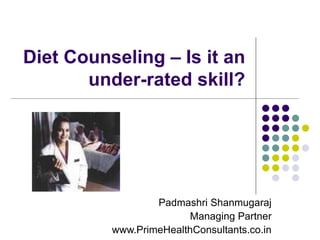
Diet Counseling - Is it an Under-rated skill?
- 1. Diet Counseling – Is it an under-rated skill? Padmashri Shanmugaraj Managing Partner www.PrimeHealthConsultants.co.in
- 2. A good counselor should Excel at ‘social marketing’ Successfully ‘sell’ healthy behavior
- 3. Stages of change-Transtheoretical model Precontemplation- Not considering change Contemplation- Thinking if change is necessary Preparation- Thinking of ideas to implement the change Action- Implements the change Maintenance – Change becomes a part of the routine Relapse – Considering difficulties involved bcos of change
- 4. Stages of change Can also be listed as: Not ready-to-change Considering meeting goals Ready-to-change
- 5. To facilitate behavior change: Express empathy- Accept patient’s concerns Understand cultural factors Be familiar with cultural norms Be aware of accepted body language Develop discrepancy – Identify advantages & disadvantages of behavior modification
- 6. Contd…. Avoid arguments- May lead o defensiveness in patient about his ideas Roll with resistance Invite new perspectives about the same idea Don’t impose – Instead of saying “Eat this!”, say “Its good for you if you eat this” Support self-efficacy Words of hope, affirmation, confidence Make patient feel responsible for his change Help him choose & implement his personal change
- 7. Stages of Intervention Interviewing Purpose: To obtain necessary information Question in non-threatening manner Begin session with introduction of yourself Begin with open-ended questions. [For eg: Questions starting with What, How, Why & Could] End with close-ended, follow-up questions Establish rapport- show interest in important aspects of patient’s life Assess current eating behavior Emphasize self-monitoring tools Diet diary Adherence ruler, so that patient can rate his level of adherence to diet
- 8. First session is the deciding factor!! During the first session Ensure privacy Reduce interruptions- No telephone calls, no staff or patients knocking on the door etc Body language [Discussed in detail later] Begin with introducing goal / subject of the session – “We are here to discuss your CHO intake with regards to your insulin dosage” Assess ‘stage of change’ & document it – Helps in facilitating the change
- 9. Body language / Non-verbal communication Your manner of sitting should reflect interest Lean forward slightly facilitating better hearing Sit across each other with no barriers in between Maintain respectful but close distance Introduction should accompany firm handshake Establish direct yet varied eye-contact Nod often to show agreement Brief periods of silence - enables patient to think & accept changes suggested
- 10. Verbal Communication Positive, confidence-building statements “Its great that…….. “I am really impressed that…… Show the patient example of his/her progress “ Its wonderful that you have lost 1 kg in the last fortnight” “I am happy that you are very disciplined about your diet” Paraphrasing Concise & to-the-point repetition of patient’s history Helps patient in re-thinking about his & dietitian’s views Summarizing Similar to paraphrasing but is more detailed Enables better communication during follow-up
- 11. ‘Not-ready-to-change’ patients Ask key open ended questions Reflective listening - Involves guessing how the patient is feeling & phrasing it as a statement and not as a question. Helps patient realize that the dietitian understands his feelings Affirm – Enables alignment & normalization of patient’s barriers to change. {“Its very normal that you are finding it difficult to resist sweets”} Summarize – Periodically summarize key points Elicit self-motivational statements – Enables patient to realize problems exist & that solutions can also be worked out
- 12. Overcoming resistant behavior Reflective listening [Discussed earlier] Double-sided reflection: Point out discrepancies, if any, in patient’s views [“On one hand you say its possible but on the other hand you say you don’t have enough time”] Shift focus: Enable optimistic outlook Agree with a twist: Agree with him but redirect conversation casually to a key topic Emphasize personal choice – Advice given can be taken or avoided: It’s a patient’s choice!! Reframe: Enable looking at things with a fresh, positive perspective
- 13. ‘Unsure-about-change’ patients First step Build readiness to change Summarize patient’s perceptions Help him explore his ‘ambivalence’ by asking him to list pros & cons of the change suggested Talk about how life would be after implementing the change- Tip the balance away from ambivalence Second step Help him choose healthier options Third step Arrive at a plan, TOGETHER!!
- 14. ‘Ready-to-change’ patients Collaborate with the patient to set goals Provide tools to use in meeting nutritional goals Help him justify the decision to make a change Map out the specifics of plan of action Help him recognize his success at achieving a goal
- 15. Ending a session Need not end with ‘agreeing’ to change Acceptance that change is necessary is good enough!! Express hope & confidence in patient’s ability to make change Arrange for next visit : Shows that dietitian is interested!!
- 16. Thank You
